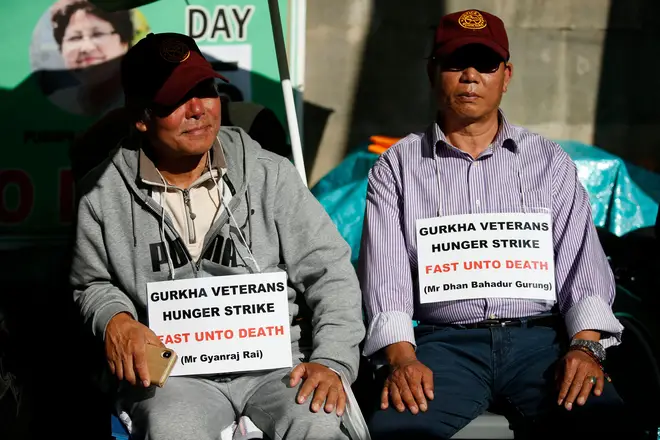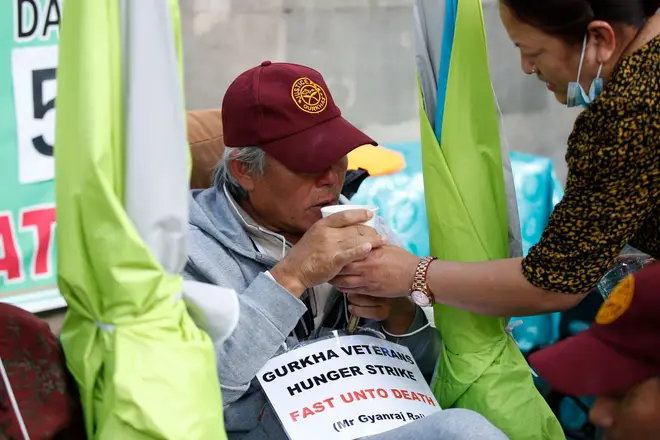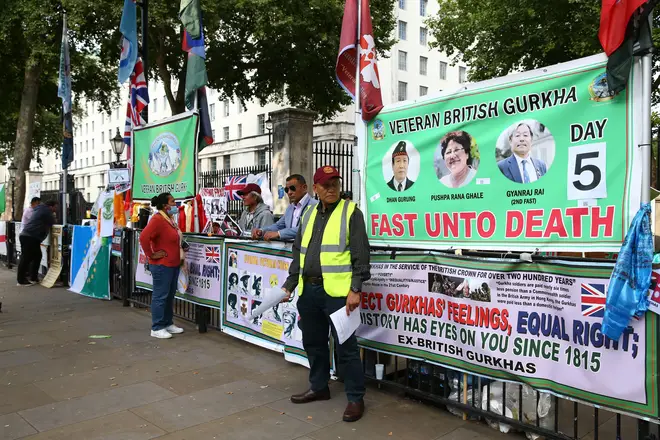
Tonight with Andrew Marr 6pm - 7pm
11 August 2021, 19:58 | Updated: 11 August 2021, 20:08

A group of Gurkhas are on their fifth day of a hunger strike outside Downing Street
A group of Gurkhas who are on hunger strike outside Downing Street has told LBC they received less pension money for their sacrifice than service dogs.
The demonstration, which has entered its fifth day, is hoping to pressure the UK Government into reviewing their army pensions so they are on a level footing with their British counterparts.
According to the Support Our Gurkhas website, the campaigners are demanding equal pensions for Gurkhas who retired prior to 1997 and are not eligible for a full UK Armed Forces pension.
Veteran Dhan Gurung told LBC: "Our Gurkha ancestors fought and gave their lives, blood, tears and sweat in order to save Great Britain and the Crown.
"But now, three of us are sacrificing our lives in order to get equal rights.
"That is our fight."

Gurkhas - Nepalese-born soldiers who have been recruited into the British Army since 1815 - who served between 1948 and 2007 were signed up to the Gurkha Pension Scheme (GPS), which closed in 2007.
Those who were still serving, or who retired after 1 July 1997 - the date Gurkhas became based in the UK - were then given the option of transferring to the Armed Forces Pension Scheme (AFPS).
GPS was based around the Indian Army model and was created for Gurkhas who retired and returned to Nepal, where the cost of living is much lower than in the UK.
However, many of those using the GPS are now living in the UK after taking up their right to settle here following a policy change by the Labour government in 2009.
It means the money they are receiving is insufficient to help them with the cost of living in the UK.

"When I retired, after being part of the service for 15 years, my monthly pension was £20, whereas my British counterparts receive £400," Mr Gurung told LBC.
"A sniffer dog's daily allowance is £22!"
He welcomed the idea of ministers coming to meet him and his fellow Gurkha veterans at the protest but said they would only pause their hunger strike if the UK Government sets a date for discussions with Nepal to find a solution to their cause.
When asked how he was feeling on day five of the fast, he said: "Look at my face. Look at my eyes. Totally weakening, weakening, weakening day by day.
"You are very lucky you are interviewing me today. Maybe tomorrow I cannot speak. Maybe the day after tomorrow I'll die.
"That's why we are demanding they solve our issues as soon as possible."
He added that if the three of them do pass away, their places will be taken by other Gurkhas who are also willing to die for the cause.

Fellow Gurkha veteran Gyanraj Rai told LBC that their strike was a last resort following 30 years of fighting for justice.
He said: "They (the British government) did not listen. They didn't listen. They bullied a poor and very small country like Nepal.
"Actually, Britain is not only bullying and abusing us, they are abusing a sovereign country that's served this nation for the last 200 years."
Mr Rai added that many Nepalese villages had been affected by the thousands of Gurkha deaths while serving in the British Army.
He then claimed that when he retired in 1995, one British soldier who served at the same rank as him received a pension that was more than 17 times larger than his. Mr Rai also said his salary while serving was less than 10 per cent of that of his British counterparts.
Read more: Deportation flight to Jamacia leaves UK after 43 granted last-minute reprieve
Read more: TfL chief refuses to rule out £3 toll for motorists on Hammersmith Bridge
The veteran then told LBC he was prepared to die for this cause.
"In the past, our grandfathers, fathers and uncles were prepared to die for this great country (the UK). Now, people are dying, those who served in the British Army, they're dying, their families are dying.
"But now we feel that we protected some evils - not the British general public, we know how much the British general public, I have told Nepalese people that British people are generous.
"But there are a gang of evils within the MoD (Ministry of Defence), who commanded the British brigade of Ghurkas, who know because we are so loyal, that we are not educated, we know nothing, we cannot complain, we cannot do politics.
"That is the advantage they are taking."
Mr Rai added: "They are killers. They are killing their protectors."
A Ministry of Defence spokesperson previously said: "We greatly value the huge contribution Gurkhas make to the British Army and ensure they are supported with a generous pension and medical care during retirement in Nepal.
"We are committed to ensuring the Gurkha Pension Scheme is sustainable and fair alongside other UK public sector pensions."
The exclusion of Gurkhas who served before 1 July 1997 from the AFPS has been challenged in the past.
In 2016, the European Court of Human Rights ruled that the move was "objectively and reasonably justified".